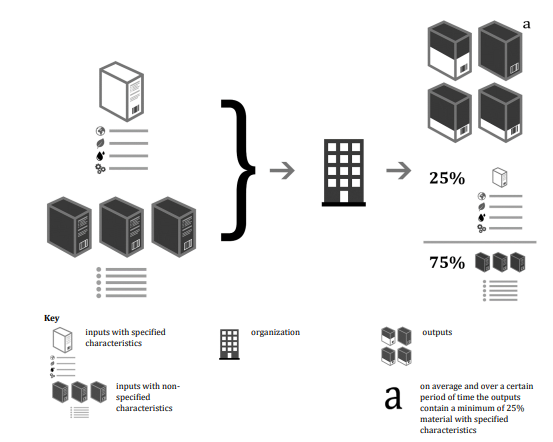
The Mass Balance Approach (MBA) enables manufacturers to increase the circularity of products without making changes to their production infrastructure. One Click LCA’s position is that standards and regulations should be developed and uniformly implemented in the industry to standardize the approach of implementing the MBA principle in LCA and EPD calculations. We align with the recent ECO Platform policy on this matter. This article is provided as background understanding on this topic.
What is the Mass Balance Approach?

|
Fig 1. Simplified illustration of the mass balance mode (Source: ISO/FDIS 22095:2020(E) )
|
The flow of renewable feedstock and recycled feedstock can be traced and balanced across the supply chain, thus facilitating a system of using existing production plants and supply chains, accelerating the circular economy without requiring new and elaborate supply chains and investments. Chain of Custody (COC)models are designed to create transparency and trust throughout the value chain regarding properties of goods and materials that are otherwise hard to distinguish between samples. The mass balance approach is one such COC model designed to trace these flows in which the inputs, outputs, and associated information are transferred, monitored, and controlled as they move through the relevant supply chain. The property conservation principle is set to ensure that the total certified output does not exceed its original input. Other well-known examples and implementation of chain of custody models are (1) Renewable Energy or Green Energy Certificates (book and claim COC model) (2) Timber – FSC (Segregation COC model) (3) Organic food from a single farm (Identity preservation COC model).
Certifications and standards for Mass Balance Approach verifications and claims
For companies to follow and control the chain of custody that they are directly active in and to communicate and make sustainability claims for their products transparently, they must be able to verify it credibly. Certification schemes that certify companies and/or products for the content and/or implementation of the mass balance approach are listed below. Each scheme has a different methodology, accounting unit, and levels (material batches, company, site-specific, across sites with physical connectedness or none) at which mass balance is verified.- The ISCC (International Sustainability and Carbon Certification) PLUS is a certification scheme run by ISCC System GmbH. ISCC is the largest of the certification systems on the market in terms of the number of certified companies and products.
- The REDcert is a certification scheme run by REDcert GmbH. REDcert focuses on the chemical industry and is the second largest of the available certification systems in terms of the number of certified companies and products.
- RSB Advanced Products – is included in the Roundtable on Sustainable Biomaterials (RSB) system. RSB is a member organization with about 100 members. This scheme focuses on products only.
- Ecoloop is a certification scheme for plastic producers, recyclers, processors, and manufacturers of plastic products. It focuses on recycled plastics and is governed by the company Ecocycle.
- ISO 22095:2020 – Chain of custody – General Terminology and Models. This standard defines a framework to provide a consistent generic approach to the design, implementation, and management of chains of custody models. However, this standard on its own is not able to support claims about an organization’s materials or products.
- EN 16785- 2 – Bio-based products – Bio-based content: Determination of the bio-based content using the material balance method which specifies a method of determining the bio-based content in products using the material balance applied to a representative product batch in a production unit.
- ISO/AWI 13662 – Chain of Custody – Mass Balance – Requirements and guidelines (Under Development) . This standard under development by ISO/TC 308 will provide a standard for products and associated processes with specified characteristics, aiming to ensure that associated claims are reliable.
Mass Balance Approach based environmental impacts calculations and declarations
Some manufacturers are using MBA in the calculations of Life Cycle Assessment (LCA) by claiming a percentage of biobased or recycled feedstock in the modelling of materials. In most studies the added share of sustainable raw materials is mathematically assigned to the corresponding mass-balanced new product. However, the modelling of recycled feedstock is not always as straightforward. Suppose the properties of the feedstock (for example, carbon and energy content) are different from those it replaces. In that case, the LCA should consider the equivalency of the products in terms of properties and interchangeability in further use. Another challenge seen is in the actual content of biobased or recycled content in the final product, which poses a challenge in the verification of the claims at the product level being analysed. In the context of the Circular Economy Action Plan, associated initiatives (Sustainable Products Initiative), and regulations (Construction Products Regulation), there is an increased emphasis on promoting circularity for products by increasing % of renewable and/or recycled content and including them in the calculations of environmental impacts. However, there is a lack of consensus and common rules and guidance to transparently use this methodology in LCA and EPD calculations. Therefore, it is imperative that standards and regulations are developed and uniformly implemented to standardize the approach of handling MBA in LCA calculations. These rules will also help in the verification process of life cycle assessments, carbon footprints, and EPDs and enable manufacturers to make claims based on verified calculations.
References
- Communication From The Commission To The European Parliament, The Council, The European Economic And Social Committee And The Committee Of The Regions A European Strategy For Plastics In A Circular Economy, 2018
- Ellen MacArthur Foundation: Enabling A Circular Economy For Chemicals With The Mass Balance Approach A White Paper From Co. Project Mass Balance, May 2019
- Standards And Certification Schemes Related To The Mass Balance Approach, Applications In Chemical Industry, Industrial Energi, 31-03-2020.
- Mass Balance Approach To Accelerate The Use Of Renewable Feedstocks In Chemical Processes, Plastics Europe.
Carbon Experts Newsletter
Industry news & insights — straight to your inbox
Want to learn more?
Melina Zacharia • Jul 26 2024
Melina Zacharia • Sep 11 2024
Melina Zacharia • Feb 05 2024
Hetal Udas • Mar 06 2024
